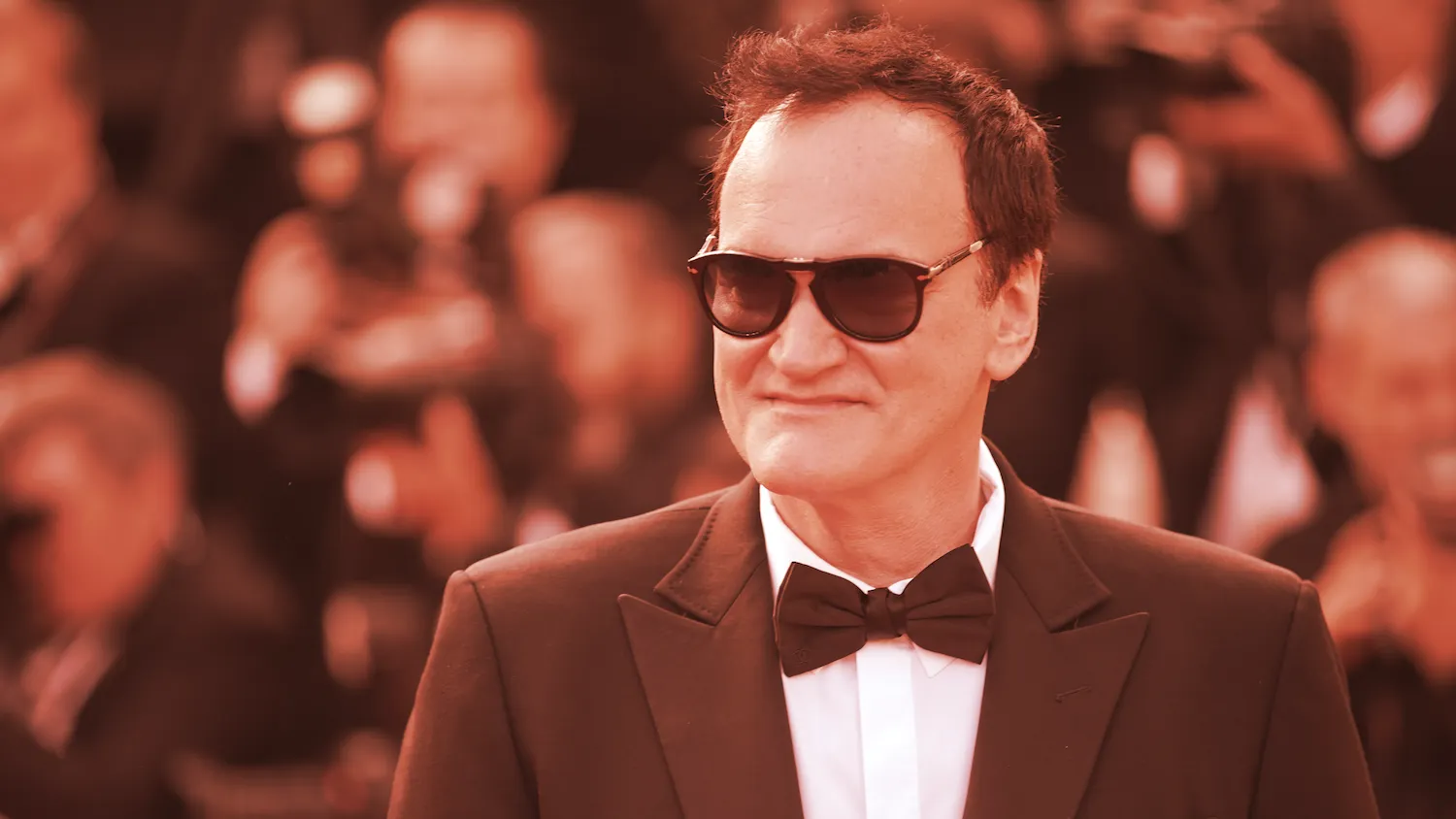In brief
- NFT collectibles based on Quentin Tarantino’s film “Pulp Fiction” will be auctioned this month.
- The sale was previously delayed due to a legal challenge from film studio Miramax.
Film director Quentin Tarantino made news in November when he announced the planned launch of NFTs based on his acclaimed 1994 film “Pulp Fiction.” However, the story took a turn soon after when film studio Miramax filed suit against Tarantino, claiming that he didn’t have the right to sell such digital items.
Now we know that Tarantino intends to sell the NFTs anyway, despite the legal challenge. SCRT Labs, the primary developer behind privacy-centric blockchain platform Secret Network and Tarantino’s partner on the project, announced the news today—a month and a half after Miramax’s suit was filed.
The seven NFT collectibles will be auctioned on separate dates beginning on January 17, with the final auction to take place on January 31. Each NFT features imagery from Tarantino’s original handwritten script for the film, paired with new audio commentary from the director himself. Unlike NFTs minted on Ethereum, Solana, and other leading blockchain networks, Secret Network’s Secret NFTs feature hidden content that can only be viewed by the owner.
Guy Zyskind, founder and CEO of SCRT Labs, told Decrypt that the project has been going “more slowly and more carefully” in the time since Miramax’s suit was filed.
Miramax claimed that Tarantino does not have the right to create and sell digital collectibles based on the film, which the studio originally distributed. The studio alleged breach of contract, copyright infringement, trademark infringement, and unfair competition, and said that Tarantino was “eager to cash in” on the rising NFT market.
The original, handwritten screenplay of the "Royale with Cheese" scene will soon be on sale! Alongside the screenplay, is a recording of Quentin Tarantino revealing secret details only available to the owner. Buy a piece of cinema history: https://t.co/geYd0rWtaS pic.twitter.com/4tqPgl3HDu
— Tarantino NFTs (@TarantinoNFTs) November 18, 2021
An NFT is a blockchain token and effectively works like a receipt that proves ownership to a digital item. It can be used for images, video files, video game items, and more, and the market for NFTs ballooned in value over the course of 2021. DappRadar estimated $22 billion worth of trading volume for the year as of mid-December.
In Tarantino’s original 1993 agreements with the studio, he maintained the right to commercialize reproductions of the script. Since the NFTs are based on the original script, Tarantino’s legal team believes that he is in the clear. Miramax wrote in its complaint that Tarantino’s reproduction rights are “far too narrow” to include NFTs, and the studio suggested that it was considering making NFTs as well.
In a statement provided to Decrypt on Wednesday, Miramax attorney and Proskauer Rose LLP Partner, Bart Williams, said: "There’s been no attempt to dismiss any of Miramax’s claims by Tarantino’s team, nor have they filed any counter claims or motions against Miramax, and since Miramax filed its lawsuit, the promotional website and Twitter account for the proposed sale have scaled back the unauthorized use of imagery from Miramax films."
Zyskind confirmed that Tarantino and SCRT Labs will not wait for the legal process to conclude. He believes that the partners have “not only the morally higher ground, but also the legal higher ground” in the dispute.
“Contractually, everything relates to the script—the screenplay itself—which is the purest, initial form of his creation, and one that doesn't really touch the production itself,” he said. “Our lawyers and his lawyers have explained to us, all of [the legal agreements] specify very clearly that he kept the rights to everything related to the screenplay itself.”
He added that the collaborators and their legal teams believe that Miramax filed the legal challenge to slow them down, rather than pursue more aggressive tactics. “If Miramax really wanted to stop these, there are other legal ways to force our hand,” said Zyskind. “It's clear to us we're in the right, and we just don't see any reason to wait.”
The delay has changed a couple details around SCRT Labs’ plans, however. Rather than launch on leading marketplace OpenSea, the team has created a custom auction house on the Tarantino NFTs website. Zyskind suggested that the marketplace would provide “a much better experience” than launching through OpenSea.
Furthermore, the collaborators have paused plans to release a subsequent “Artifact Collection” with digital recreations of props from Tarantino’s various films. Zyskind said that the decision came from Tarantino’s team, which wants to hold off “given the legal stance.” However, he said that they’ve had a chance to “rethink things,” and may pursue additional Tarantino NFT projects following the initial “Pulp Fiction” collectibles.
The Tarantino NFTs were planned to be SCRT Labs’ big coming out party for Secret NFTs. While the delay scuttled that plan, the Secret Network blockchain has seen an array of other community-led NFT projects over the last couple months.
Furthermore, Zyskind sees big potential for NFT-powered games to take advantage of the network’s privacy-focused tech, and teased other collaborations with notable creators ahead. Even if the legal complaint delayed the sale, the high-profile “Pulp Fiction” announcement has accelerated SCRT Labs’ wider NFT plans.
“We feel so strongly about it, and we got so much backwind from the Tarantino use case,” he said. “People from many industries—entertainment, sports, and gaming—have reached out to us, and we're talking to a lot of them. Basically, we've decided to expand and build a team dedicated to Secret NFTs.”
Editor's note: This story was updated after publication to include comments from a Miramax representative.

